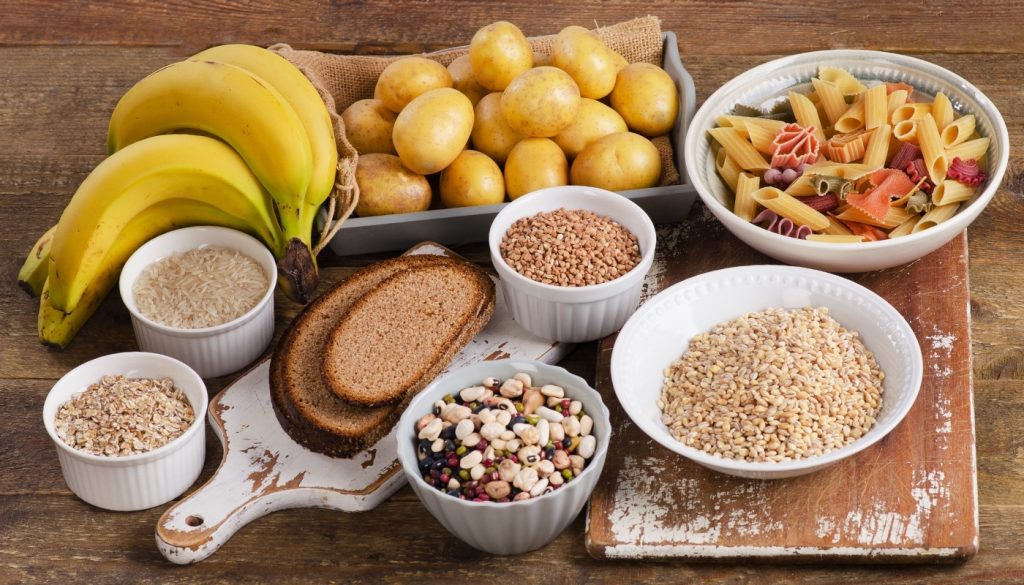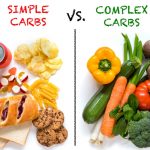There are three macronutrients that we need for our body in a healthy diet: carbohydrates, protein, and fat.
Carbohydrates, also known as carbs are your body’s main source of energy. Carbohydrates provide the body with glucose, which is converted to energy used to support bodily functions and physical activity. Carbs provide energy for the brain, kidneys, working muscles, and central nervous system in the body.
A carbohydrate-deficient diet may cause headaches, fatigue, weakness, difficulty concentrating, nausea, constipation, bad breath, and vitamin and mineral deficiencies.
A high-carb diets have been connected to a higher risk of chronic disease, decreased physical activity, and obesity. However, carbohydrate quality has been shown to play a more critical role in health than the amount of carbs.
Carbohydrates are made up of three components: sugars, starches, and fiber.

Sugars are also called simple carbohydrates because they are in the most basic form. They can be added to foods, such as the sugar in candy, desserts, processed foods, and regular soda. They also include the kinds of sugar that are found naturally in fruits, vegetables, and milk.

Starches are complex carbohydrates, which are made of lots of simple sugars strung together. Your body needs to break starches down into sugars to use them for energy. Starches include bread, cereal, and pasta. They also include certain vegetables, like potatoes, peas, and corn.

Fiber is also a complex carbohydrate. Your body cannot break down most fibers, so eating foods with fiber can help you feel full and make you less likely to overeat. Diets high in fiber have other health benefits. They may help prevent stomach or intestinal problems, such as constipation. They may also help lower cholesterol and blood sugar. Fiber is found in many foods that come from plants, including fruits, vegetables, nuts, seeds, beans, and whole grains.

Here are the 5 reasons why carbohydrates are important for your diet:
Carbs help control your weight.
Many people believe that carbs make you fat, when the truth is that, if consumed moderately they can actually help control your weight and aid in weight loss. Some of the best carbs for weight loss include rye, quinoa, lentils, barley, and oatmeal.
Carbs lower cholesterol levels.
Insoluble fiber is the type of fiber found in foods like oatmeal, nuts, beans, apples, and blueberries. And it has all sorts of heart-healthy benefits. Soluble fiber helps to blunt the rise in blood sugar levels after eating and is highly effective at lowering blood cholesterol levels and heart-related diseases.
Carbs gives you energy.
Part of the importance of carbs is that they are your body’s preferred energy source. The sugars and starches in carbohydrates are broken down and absorbed, they enter your bloodstream, which is then called blood glucose. This glucose in the blood stimulates the pancreas to secrete insulin. Insulin tells the body to either absorb the glucose to use as energy or to store it.
Carbs help preserve muscle.
Glycogen storage is one of several ways your body makes sure it has enough glucose for all of its functions. When glucose from carbohydrates is lacking, the muscle can also be broken down into amino acids and converted into glucose or other compounds to generate energy. Muscle cells are crucial for body movement. Severe losses of muscle mass lead to poor health and a higher risk of death. Carbs help reduce muscle breakdown, provide glucose as energy for the brain, and prevent muscle loss.
Carbs promote digestive health.
Unlike sugars and starches, dietary fiber is not broken down into glucose. The dietary fiber present in natural carb foods is important for optimal intestinal health. These foods help with effective waste removal, prevent constipation, and reduce bloating. This is one benefit of eating whole food sources of carbs such as whole grains, beans, legumes, vegetables, and fruits instead of opting for processed foods.




